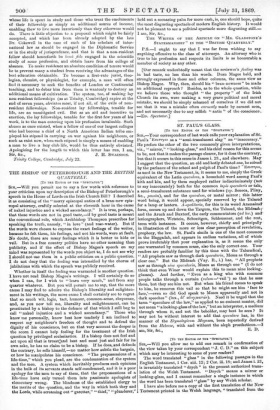THE BISHOP OF PETERBOROUGH AND THE BRITISH QUARTERLY.
To THE EDITOR OF THE "SPECTATOR.") SIE,-Will you permit me to say a few words with reference to your criticism upon my description of the Bishop of Peterborough's speech in the House of Lords on the Irish Church Bill ? I described it as consisting of the "merry episcopal antics of a bran-new epis- copal attorney, craftily selected at the eleventh hour in the cause of naked injustice and a wicked ascendancy." It is true, perhaps, that these words are not in good taste,—if by good taste is meant the conventional rule, which Archbishop Thompson prescribes for speaking the truth, namely, " in love " (and rose-water). But if the words were chosen to express the exact feelings of the writer, because he felt them, his feelings, and not his words, were at fault. No doubt, there are many feelings which it is better to hide or veil. But in a free country politics have no other meaning than publicity, and if the effect of Bishop Magee's speech on my mind was represented by the words you object to, I do not see why I should not use them in a public criticism on a public question. I do not deny that the feeling was intensified by the chorus of jubilations with which the speech was publicly received.
Whether in itself the feeling was warranted is another question. I have not read Bishop Magee's writings. I will certainly do so when I can, for I wish to " learn very much," and from any quarter whatever. But you will permit me to say, that the more cause I may find to admire the Bishop's liberality and enlighten- ment in his writings, the more cause I shall certainly see to regret that so much wit, logic, tact, humour, common-sense, eloquence, and, as you now tell me, liberality and enlightenment, can be prostituted by a bishop to the defence of that which I still beg to call "naked injustice and a wicked ascendancy." Those who know me personally, know best how tenderly I am inclined to respect my neighbour's freedom of thought and to defend the dignity of his conscience, but on that very account the deeper is the scorn I cannot help feeling for the treatment of the Irish question by privileged ecclesiastics. If a bishop does not feel and act upon all that is truest:and best and most just and fair for its own sake, he has no claim to be a bishop. If he does, and defends the contrary, he sells himself,—no matter how subtle the bargain, or how he manipulates his conscience. "The prepossessions of a life-time," which you plead, are the condemnation of the system and the men. A system which inevitably produces such opinions in the bulk of its servants stands self-condemned, and it is a poor apology for the men to say of them, that the prepossessions of a life-time have only turned them into passionate apologists of elementary wrong. The blindness of the established clergy to the merits of the question, and the way in which both they and the Lords, while screaming out " garotter," " thief," " plunderer,"
I held out a menacing palm for more cash, is, one should hope, quite the most disgusting spectacle of modern English history. It would not be pleasant to see a political spectacle more disgusting still.- 1 am, Sir, &c.,
THE WRITER OF THE ARTICLE ON "MR. GLADSTONE'S STATESMANSHIP" IN THE "BRITISH QUARTERLY."
P.S.—I ought to say that I was far from wishing to say anything offensive to the class of attorneys. An attorney who is true to his profession and respects its limits is as honourable a. member of society as any other.
[Our remark undoubtedly meant that the reviewer's feeling was in bad taste, no law than his words. Dean Magee held, and strongly expressed in these and other columns, the same view as Bishop Magee. Why, then, should his " bran-newness " be made an additional reproach ? Besides, as to the whole question, while we believe those who thought " the property " of the Irish Church its own, were making a very grave political and moral mistake, we should be simply ashamed of ourselves if we did not see that it was a mistake often earnestly made by earnest men, and not necessarily due to any selfish " antic " of the conscience. —ED. Spectator.]






























 Previous page
Previous page